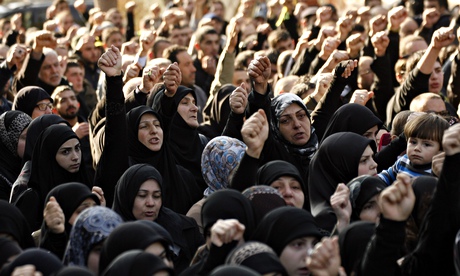Israel unaware killed Iranian general was in Hezbollah convoy in Syria
Senior Israeli security source’s claim comes as Iran threatens to retaliate for killing of Mohammed Allahdadi in Sunday’s air strike
Israel was apparently unaware an Iranian general was travelling in a Hezbollah convoy it targeted with an air strike in Syria on Sunday, killing the general as well as a senior Hezbollah commander.
The claim – made by an unnamed senior Israeli security source in an interview with Reuters on Tuesday – came as Iran threatened to retaliate for the killing and amid growing concern about the security situation on Israel’s northern border with Lebanon and Syria.
Although Israel has not officially confirmed it carried out the strike on a convoy of several cars near the Syrian border village of Quneitra, it has been widely assumed that Israel was behind the attack.
UN observers on the border also reported seeing Israeli drones in the vicinity before the attack.
According to the source – quoted by the news agency – Israel’s armed forces believed it was targeting a group of relatively low-level members of the Lebanese Shia organisation which has been fighting alongside the government forces of Syria’s Bashar al-Assad.
The comments came as Israel’s security cabinet was due to meet and amid indications that Israel was trying to limit the fallout from the killing of Iranian Revolutionary Guard General Mohammed Allahdadi.
Speculation has been rife since the killing about why Allahdadi was on the border to close to Israel, with some reports claiming he had been tasked with overseeing new missile locations for Hezbollah.
“We did not expect the outcome in terms of the stature of those killed – certainly not the Iranian general,” the source said. “We thought we were hitting an enemy field unit that was on its way to carry out an attack on us at the frontier fence.”
“We got the alert, we spotted the vehicle, identified it was an enemy vehicle and took the shot. We saw this as a limited tactical operation.”
The assumption in Israeli security circles is that retaliation of some kind is likely – and would probably be carried out by Hezbollah.
Israel has boosted deployment of its “Iron Dome” anti-missile aerial defence system along its northern frontier, which borders Lebanon and Syria, and has increased surveillance activities in the area.
“They are almost certain to respond,” added the source. “We are anticipating that, but I think it’s a fair assumption that a major escalation is not in the interest of either side.”
Allahdadi was killed with a Hezbollah commander and the son of the group’s late military leader, Imad Moughniyeh, in Sunday’s attack on a convoy near the Israeli-occupied Golan Heights.
The sense of tension following the air strike was underlined by comments made by Iranian Revolutionary Guards’ head, General Mohammad Ali Jafari, on Tuesday, who was quoted by Fars news agency warning of retaliation.
“These martyrdoms proved the need to stick with jihad. The Zionists must await ruinous thunderbolts. The Revolutionary Guards will fight to the end of the Zionist regime … We will not rest easy until this epitome of vice is totally deleted from the region’s geopolitics.”
The aftermath of the air strike has attracted mixed commentary in Israel. Security sources believe Hezbollah’s entanglement in Syria on the regime’s side makes it unlikely that it will want escalate the confrontation to a repeat of the full-blown war Hezbollah and Israel fought in 2006.
Asked about the death of Allahdadi Yaakov Amidror, former head of Israel’s National Security Council said: “The fact that a senior Iranian is involved, who was involved in planning actions against Israel, is on the benefit side. The presence of a senior Iranian must also come up on the price side. And if his presence was known to the decision-makers, this should have been on the table as part of the problem.”
THE GUARDIAN

